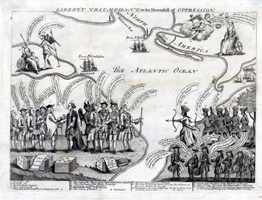The Impact of the Coercive Acts

Parliament's response to the Boston Tea Party was innovative and unprecedented. Closing Boston's port, revoking the colony's charter, and reconfiguring its political and judicial systems appeared to Lord North and other imperial policy maker as just the kind of decisive action needed to restore harmony and calm to British America.
It is clear today that North's ministry and Parliament were wrong in almost every conceivable way. In fact, it's hard to imagine how the Coercive Acts could have been better designed to justify almost every radical claim that rampant corruption had eaten away the heart of the British constitution, turning its treasured institutions into tools of tyranny. The Massachusetts Government Act the foundations of constitutional government cherished by colonials as the guarantor of liberty and property. The Administration of Justice Act threatened the ancient right of trial by jury and raised the historical specter of secret courts. The Boston Port Act required warships sent from one British port to engage in an act of civil war by blockading another British port on a different side of the Atlantic. The Quebec Act resurrected traditional fears of Popish plots to undermine Protestantism by protecting the Catholic Church, while it also struck at the more mundane, but still potent concerns of western land speculators who saw the source of their future wealth vanishing into a "foreign" jurisdiction. Nearly every colonial fear was given form in these acts.
Along with the rank, unimaginably obtuse political miscalculation was an almost complete lack of practical foresight on the part of the British ministry. Parliament showed that it could pass the Intolerable Acts, but not that it could enforce them. The Massachusetts Government Act, for example, could be enforced in only two ways: cooperation or force. Because cooperation was impossible, force became inevitable. Even so, it took almost a year before Lord North's government attempted to turn the language of the legislation into real punishment for Boston. In the meantime, the explicit threat posed to the other colonies by the Coercive Acts generated a flurry of activity in all of the colonies to defend themselves and to act in union, which led to the First Continental Congress.




